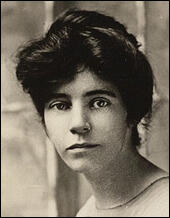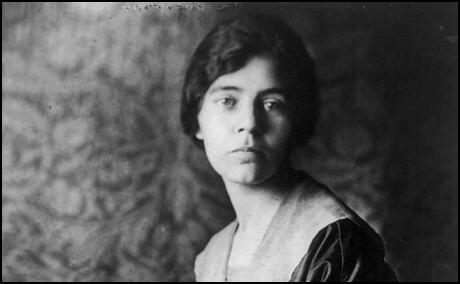Alice Paul

Alice Paul was born into a Quaker family in Moorestown, New Jersey on 11th January, 1885. Educated in the United States at Swarthmore College and Pennsylvania University, where she earned a master's degree in sociology. In 1907 Paul she moved to England where she was a Ph.D. student at the School of Economics and Political Science (LSE).
In 1908 Paul heard Christabel Pankhurst make a speech at the University of Birmingham. Inspired by what she heard, Paul joined the Women's Social and Political Union (WSPU) and her activities resulted in her being arrested and imprisoned three times. Like other suffragettes she went on hunger strike and was forced-fed.
After one arrest Paul met Lucy Burns, another American who had joined the WSPU while studying in England. Paul returned home in 1910 where she became involved in the struggle for women's suffrage in the United States.
In 1913 Paul joined with Lucy Burns to form the Congressional Union for Women Suffrage (CUWS) and attempted to introduce the militant methods used by the Women's Social and Political Union in Britain. This included organizing huge demonstrations and the daily picketing of the White House.

After the United States joined the First World War, Paul was continually assaulted by patriotic male bystanders, while picketing outside the White House. In October, 1917, Paul was arrested and imprisoned for seven months.
Paul went on hunger strike and was released from prison. In January, 1918, Woodrow Wilson announced that women's suffrage was urgently needed as a "war measure". However, it was not until 1920 that the 19th Amendment secured the vote for women.
Paul continued to campaign for women's rights and in 1938 founded the World Party for Equal Rights for Women (also known as the World Women's Party). Paul also successfully lobbied for references to sex equality in the preamble to the United Nations Charter and in the 1964 Civil Rights Act.
Alice Paul died in Moorestown, New Jersey, on 9th July, in 1977.
Primary Sources
(1) Leaflet written and distributed by Alice Paul outside of the White House.
President Wilson and Envoy Root are deceiving Russia. They say "We are a democracy. Help us to win the war so that democracies may survive." We women of America tell you that America is not a democracy. Twenty million women are denied the right to vote. President Wilson is the chief opponent of their national enfranchisement. Help us make this nation really free. Tell our government that it must liberate its people before it can claim free Russia as an ally.
(2) Alice Paul, letter to Doris Stevens (November, 1917)
At night, in the early morning, all through the day there were cries and shrieks and moans from the patients. It was terrifying. One particularly meloncholy moan used to keep up hour after hour with the regularity of a heart beat. I said to myself, "Now I have to endure this. I have got to live through this somehow. I pretend these moans are the noise of an elevated train, beginning faintly in the distance and getting louder as it comes nearer." Such childish devices were helpful to me.
(3) Rose Winslow was in prison with Alice Paul in November 1917.
Yesterday was a bad day for me in feeding. I was vomiting continuously during the process. The tube has developed an irritation somewhere that is painful. Don't let them tell you we take this well. Miss Paul vomits much. I do, too, except when I'm not nervous, as I have been every time against my will. We think of the coming feeding all day. It is horrible.
(4) Crystal Eastman, Time and Tide (20th July, 1923)
History has known dedicated souls from the beginning, men and women whose every waking moment is devoted to an impersonal end, leaders of a "cause" who are ready at any moment quite simply to die for it. But is it rare to find in one human being this passion for service and sacrifice combined first with the shrewd calculating mind of a born political leader, and second with the ruthless driving force, sure judgment and phenomenal grasp of detail that characterize a great entrepreneur.
It is no exaggeration to say that these qualities are united in Alice Paul, the woman who inspired, organized and led to victory the militant suffrage movement in America and is now head of the Woman's Parry, a strong group of conscious feminists who have set out to end the "subjection of women" in all its forms.
Alice Paul comes of Quaker stock and there is in her bearing that powerful serenity so characteristic of the successful Quaker. Like many another famous general she is well under five foot six, a slender, dark woman with a pale, often haggard face, and great earnest childlike eyes that seem to seize you and hold you to her purpose despite your own desires and intentions. During that seven year suffrage campaign she worked so continuously, ate so little and slept
so little that she always seemed to be wasting away before our eyes. Once in the early years, when the Union was housed in a basement impossible to ventilate she seemed so near to collapse that she was taken, under protest, to a nearby hospital to rest. But she had a telephone put in by her bed, and went right on with the campaign, forgetting, as usual, to eat and sleep. After a few weeks of this she got up and packed her bag and came back to the foul air and artificial light of that crowded basement headquarters. And nothing more was said about a breakdown. The truth is, of course, that she looks frail, as anyone would who was subjected to constant overwork and under- nourishment, but actually she possesses a bodily constitution of extraordinary strength, and a power of physical endurance that quite matches her indomitable spirit.
(5) Alice Paul, letter to Heywood Broun after an article he published on Inez Milholland (26th August, 1924)
I have read your statement that the Woman's Party "did not want a Negro to speak at the grave of Inez Milholland" and am writing to give you the facts.
The pilgrimage to the grave of Inez Milholland was organized by the Woman's Party. It consisted almost entirely of Woman's Party members who had worked with Inez in the suffrage fight, although we also invited her family and friends to accompany us. We arranged a very simple ceremony of music and singing, and, at the urgent request of a member of Inez's family we arranged to have no speakers at the grave.
Shortly before the service began, Mr. Milholland, the father of Inez, told us that he had invited Mr. Scott a distinguished Negro, to speak at the grave. We explained to Mr. Scott that there were to be no speeches at the grave and asked if he would place a wreath as the rest of us were doing, instead of making a speech. To this suggestion he immediately acceded.
After we had placed our wreaths and the choir was leading the procession down the hillside, Mr. Milholland called upon Mr. Scott and Mrs. Hunton, secretary of the Association for the Advancement of Negroes, to speak. The Woman's Party members listened with courtesy to these two speakers and at the conclusion expressed appreciation to them of what they had said. These two Negroes were the only speakers at the grave.
At this point I want to make clear that these two speakers did not intentionally break into our service. They came to the pilgrimage, we understand, under the impression that it had been organized by the Milholland family, that speeches were to be made at the grave dealing with various political, social and economic movements with which Inez had been connected and that they were to represent upon this occasion the movement for the advancement of Negroes. As soon as they learned that the memorial at the grave was a Woman's Party memorial, that it was to commemorate the service of Inez in the suffrage cause, and that there were to be no speakers, they fell in with these plans and would not have spoken had they not been publicly called upon to do so.
I would like, before concluding, to take up two statements which you make. You write: 'They did not want a Negro to speak at the grave of Inez Milholland, because, as Mrs. Greta Wold Boyer explained, 'We want to try and elect some congressmen in Southern States.'" This statement was not made by Mrs. Boyer and could not have been made because we are not trying to elect congressmen in any Southern State.
You attribute the following statement to me: "This was arranged as a demonstration of women and it was no place for colored people to speak." With regard to colored people as speakers, we arranged as I have already said, to have no speakers, and the question of color of speakers was never discussed by us.
The Woman's Party is made up of women of all races, creeds and nationalities who are united on the one program of working to raise the status of women. In our organization there is absolutely no discrimination with regard to race, creed or nationality. If we had planned to have speakers on this occasion, the question of their race would not have been considered in selecting them.
We are sorry that this controversy has arisen over our effort to honor one of our fellow-workers. I think that all the women of the Woman's Party who went upon this pilgrimage did so with the single desire of expressing their affection for Inez. They had no thought of political effect or expediency in what they were doing and greatly regret that the effort has been made to use this pilgrimage against the interest of the woman's cause to which Inez gave her life.
(6) Rebecca West, reviewed Jailed for Freedom by Doris Stevens in Time and Tide on 24th March, 1922.
The resuscitation of the suffrage agitation in the United States from the catalepsy of unhopeful routine into which it had fallen at the death of Susan B. Anthony, was due to Alice Paul, whom many of us remember as a brown wisp of Americanism who had rather unaccountably strayed into the ranks of Holloway prisoners. It appears that she returned home an inspired leader. She was equipped with that gift of double vision which, though we speak of those prophets we respect as single-eyed, is nevertheless the first necessity of great leadership: a Talleyrand-like awareness of the baseness of our enemies and the infirmities of our supporters combined with a Franciscan faith that innocency is the normal condition of human affairs, and will prevail again when these quite temporary disturbances are quelled. She had magnificent courage of the profound, enduring sort. This she needed badly, for apart from the rough and tumble of street attacks and forcible feeding (which she had already experienced in Holloway) she was exposed to great mental torture. When she led a hunger strike in the Washington District Jail the authorities sent doctors to her, who made it plain to her that they were examining her with a view to sending her to the State Asylum as a victim of persecution mania, on the ground that she had an obsession on the subject of President Wilson. As this had no effect on her resolution, they then put her in a psychopathic ward among criminal lunatics, who were awaiting dispatch to the asylum, and ordered a nurse to go to her once every hour all through the night and flash an electric light into her face, so that she was prevented from sleeping for more than a few minutes at a time. This also had no effect upon her, and she carried on the hunger strike till the Administration was beaten and had to release all suffrage prisoners.

